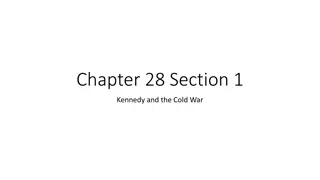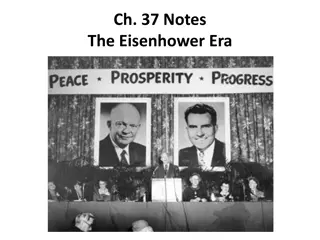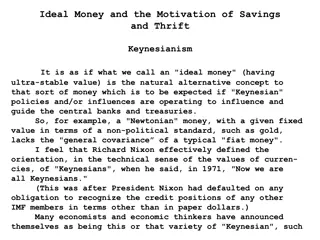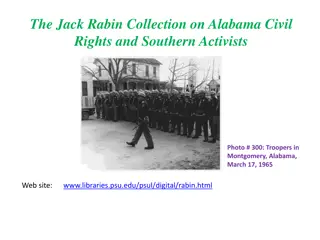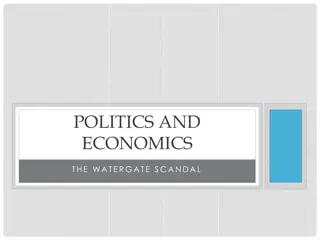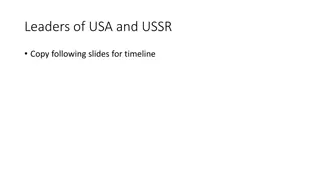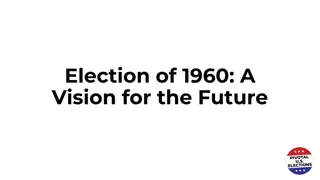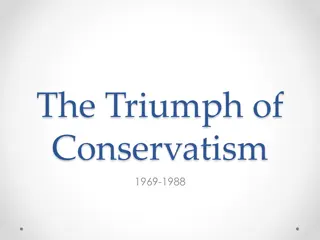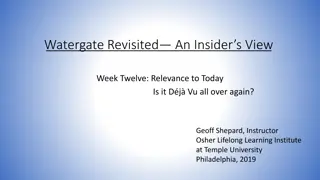Kennedy and the Cold War: A Presidential Election and New Strategies
Kennedy's victory over Nixon in the 1960 presidential election paved the way for new Cold War strategies. Despite differences in upbringing, Kennedy's televised debate win and swift actions during unexpected events secured his narrow victory. With a focus on enhancing the nation's armed forces, Kenn
0 views • 17 slides
Mastering Financial Newsgathering Techniques: Insights from Prof. Nixon K. Kariithi
Explore essential strategies for covering economic sectors and institutions effectively, including learning the economic language, understanding key issues and players, cultivating trusted sources, and translating complex jargon for broader audience comprehension. Gain valuable insights on navigatin
0 views • 9 slides
Insights into the Eisenhower Era and Dynamic Conservatism
The content delves into key events during the Eisenhower era, including the Election of 1952, Nixon's Checkers Speech, Eisenhower's dynamic conservatism, the Federal Highway Act of 1956, and the impact of the highway system on American culture. It highlights Eisenhower's leadership style, the changi
4 views • 31 slides
Exploring Ideal Money and Keynesianism in Economic Policies
Exploring the concept of "ideal money" in contrast to Keynesian influences on central banks and treasuries. The discussion touches upon the stability of currency values, Nixon's declaration of being Keynesian, and how Keynesianism is approached as a political movement seeking wealth redistribution f
0 views • 22 slides
The Jack Rabin Collection: Alabama Civil Rights Movement
Explore historical images documenting key moments of the civil rights movement in Alabama, including the Selma-to-Montgomery March and demonstrations in Montgomery. Images feature prominent figures like Martin Luther King Jr. and E.D. Nixon, showcasing the resilience and activism of Southern activis
0 views • 12 slides
The Nixon Administration: Politics and Economics in the 1960s
The Nixon Administration in the 1960s appealed to Middle America with promises of restoring order and appealing to conservative values. Nixon's Southern Strategy, focus on law and order, implementation of the New Federalism program, and attempts to reform welfare systems were key aspects of his pres
0 views • 13 slides
The Election of 1960: Key Points and Impact
The Election of 1960 was a crucial event in American history, marked by the Cold War tensions, civil rights issues, and the close race between John F. Kennedy and Richard Nixon. Kennedy's victory by a slim margin had a significant impact on the country, shaping his vision for the New Frontier. Explo
0 views • 6 slides
The Watergate Scandal: Nixon, Woodward, and the Cover-Up
The Watergate scandal was a political crisis that unfolded in the early 1970s, ultimately leading to President Nixon's resignation. It began with the break-in at the Democratic Party's office in the Watergate complex, followed by investigative reporting by Bob Woodward and the unraveling of a cover-
0 views • 14 slides
Leadership Timeline: USA and USSR Leaders
Explore the timeline of leaders from the United States and the Soviet Union, showcasing significant figures such as Harry Truman, John F. Kennedy, Richard Nixon, Joseph Stalin, Nikita Khrushchev, and more. Witness the transitions in leadership that occurred during critical periods in history.
0 views • 8 slides
A Look at the Crisis and Resurgence of 1969-1980 in American History
The period from 1969 to 1980 in the United States was marked by significant events such as the Equal Rights Amendment, the feminist backlash, Nixon's approach to civil rights, Democratic Congress initiatives, economic challenges leading to stagflation, the Energy Crisis, and Nixon's foreign policy t
0 views • 15 slides
The Election of 1960: A Reflection on Americans' Views
The election of 1960 served as a barometer of Americans' perspectives on the Civil Rights Movement and the Cold War. It highlighted the issues of civil rights and foreign affairs, with escalating tensions addressed by candidates Kennedy and Nixon. Despite Kennedy's optimistic idealism and victory, c
0 views • 8 slides
Richard Nixon - American President and Controversial Figure
Richard Nixon, the 37th President of the United States, had a successful political career before his presidency, being elected to the House of Representatives in 1946 and to the US Senate in 1950. He was defeated by John F. Kennedy in the 1960 election for President. Nixon is mainly remembered for t
1 views • 9 slides
The Triumph of Conservatism 1969-1988: A Historical Overview
Gerald Ford's controversial pardon of Nixon, Carter's outsider promises, Camp David peace efforts, Middle East upheavals, Iran crisis and Afghanistan involvement under Carter's administration, and the rise of the religious right, reflecting political shifts during the late 20th century.
0 views • 18 slides
The Watergate Scandal: A Presidential Crisis
The Watergate scandal of 1972 involved a break-in at the Democratic National Committee headquarters by members of the Committee to Re-elect the President (CREEP), setting off a chain of events that led to President Nixon's resignation. The cover-up, investigations, Senate hearings, demands for tapes
0 views • 6 slides
Trump vs Nixon: Parallels and Contrasts in Political History
Delve into the striking similarities and differences between President Trump and President Nixon in the context of historical events such as Watergate. Explore the actions of special prosecutors, challenges faced by both leaders, and the impact of political climate and media on their presidencies. R
0 views • 21 slides
